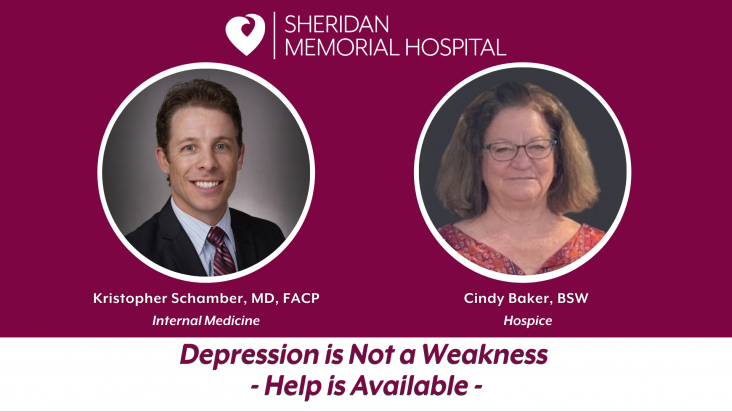Sheridan Press Senior Page Column
December 2021
By:
Kristopher Schamber, MD FACP, is a physician with Sheridan Memorial Hospital Internal Medicine and medical director of the SMH Hospice Program.
and
Cindy Baker is the social worker and bereavement counselor for the SMH Hospice Program and owns a wellness studio where she teaches Ayurveda and yoga.
The holidays can be a joyful time, filled with laughter, fun, and togetherness. However, the holidays can bring despair to those who have lost loved ones around the same time, are alone, suffering from chronic mental health disorders, struggling with money or illness, and many other situations.
First and foremost, depression is a real disease, just like high blood pressure, diabetes, or any other medical illness. Depression is not a weakness.
One can experience a short bout of depression or develop new or worsening clinical depression.
It is important for us all to recognize the symptoms of depression in ourselves and others. Admittedly, it is often easier for others to see one’s depression. Depression is more than simply a down or depressed mood. There are often physical or cognitive symptoms as well, and can include: hopelessness; feeling bad about yourself – or that you are a failure or have let yourself or your family down; little interest or pleasure in doing things; trouble falling or staying asleep, or sleeping too much; feeling tired or having low energy; poor appetite or overeating; trouble concentrating; lack of attention; moving or speaking so slowly that other people noticed; and being forgetful.
If you are experiencing depression, whether it just came up or is long-standing, be sure to seek out help. In general, treatment consists of counseling with a licensed professional, medications, or a combination of the two. Medications are typically reserved for more severe or longer-lasting cases. And medications do not take effect immediately, and in fact, can take many weeks or months for effect. Counseling, or therapy as it may be called, may have a more immediate effect and can be used when a difficult occasion such as a holiday, anniversary of a death or significant trauma, or similar event may come up for a short period of time.
If a holiday or anniversary is approaching, it can be helpful to plan something to do on that day to commemorate, acknowledge it or even distract. It could be something familiar or entirely different, such as planning a hike, planting a tree, lighting a candle, journaling, spending time with a friend who understands, or even scheduling an extra appointment with your therapist. Be sure to practice self-care, making a point to do the things that bring you joy or relieve stress: take a walk, exercise, call your family and friends, connect with an old friend, or do other activities.
Some people may feel so depressed and helpless that they believe the only way out is to take their own life. Be sure to tell love-ones or close friends how you feel so they can help support you through the difficult time. Be as honest as you can about how you are feeling, even if suicidal. This should include a safety plan so that you and your close confidants know what to do if your depression is severe enough that you are considering ending your life. A safety plan should include consideration of who you call first. This can include 911, the Wyoming Suicide Prevention Hotline, your primary doctor, the ER, or others. Ideally, this should include at least one emergency service (i.e., the ER) and a close confidant who knows you and your illness well, one who can stay with you until emergency services arrive, and who can tell your story if you are unable to do so.
If you are supporting someone with depression, your main job is to support and not necessarily heal. You should recognize that what they are feeling is real and let them know you understand. Our natural instinct is to fix, and often someone who is depressed instead needs a friend who can be a listening presence for their emotions and thoughts to be heard and validated. Make sure you have a clear understanding of their safety plan and confirm that you are a support for them.

